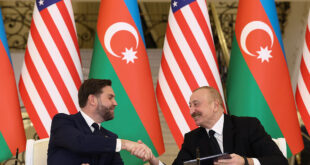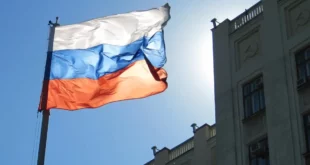President Vladimir Putin said on Tuesday he expected a parliamentary election on December 2 to give him a “moral right” to influence Russian politics after he steps down from his Kremlin post next year.Putin is heading the list of candidates for the main pro-Kremlin party, United Russia. The party is likely to win a majority of seats, according to opinion polls, but Putin’s own plans after leaving office remain unclear.
“If people vote like you for United Russia … that would mean the majority of citizens trust me,” he said as he shared a cup of tea with construction workers during a visit to the Siberian city of Krasnoyarsk.
“That would mean in turn that I will have a moral right to ask people who will work in the Duma (parliament) and the government how they will carry out the decisions we are making today,” he added.
Putin has to step down by next May after presiding over eight years of rapid economic growth and rising incomes, which have made him by far Russia’s most popular politician. The constitution forbids a third consecutive term in office.
Putin has so far rejected growing calls by allies to change the constitution to allow another term, but has made clear he will maintain influence after handing over power to ensure the continuation of his policies.
How he will do this in a country where political power is heavily concentrated in the Kremlin remains Russia’s biggest political mystery and Putin on Tuesday did not give any clues.
“I will refrain from a direct reply about the form in which this will be done,” the president said. “But there are various options. And if this happens, if the (election) result is the one that I am counting on, I will get this chance.”
RISKS
Russian politicians have said that regional governors have been instructed to ensure United Russia wins at least 70 percent of the vote next month, matching Putin’s own poll ratings.
United Russia has billed the parliamentary elections as a “referendum on Putin” and has relied heavily on the president’s personal standing for its campaign, whose motto is “Putin’s Plan — Victory for Russia”.
United Russia benefits from its association with the popular Putin but opinion polls show voters are skeptical about the party itself, believing it attracts opportunists who join because they are seeking personal gain.
When asked by a road construction worker about the party, he said in unusually frank comments that United Russia was “of course not” an ideal vehicle.
“Nevertheless it is close to the authorities. And as a rule various scoundrels try to join such organizations and they partly succeed.”
“Why did I decide to head the election list of the party? Simply because there is nothing better,” he added.
Leaders of Russia’s weak and fractured liberal opposition, who have no chance of winning parliamentary seats, say the Kremlin is using its immense power and influence to guarantee a resounding poll victory for its favorite party.
Analysts say Putin has a number of options after leaving the Kremlin. The role of parliamentary majority leader, formal or informal, would give him an obvious chance to control Russia from outside the president’s chair.
“If we manage to maintain co-operation between the executive and legislative branches of power, we will have every chance to carry out all our plans,” Putin added.
But the 55-year-old leader has other options.
Putin has hinted he could take the job of prime minister in a future government, though some analysts consider this unlikely because of the post’s limited powers and relatively low status.
Russian media have also speculated he could head the Kremlin’s Security Council or even act as a “national leader” without an official post.
 Eurasia Press & News
Eurasia Press & News



